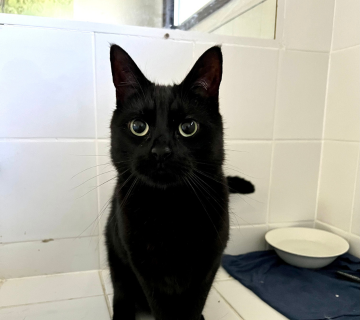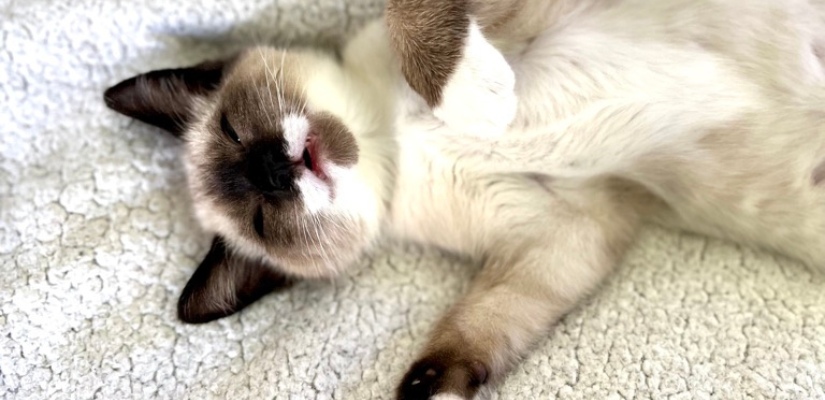Lavender, with its delicate purple blossoms and calming fragrance, has long been cherished by humans for its soothing properties. We use it in various forms, from essential oils to scented candles, to create a tranquil atmosphere in our homes. But, what about our feline friends? While lavender may be a delight to our senses is lavender safe for cats? Well the answer is it can pose a potential threat to cats.
Cats aren’t human, and that means some things we enjoy can be dangerous for them. Even when we have their best interests at heart and just want to share what we love with our pets, we have to remember they aren’t the same as us. It’s always important to be aware of what our pets might breathe in, ingest, or absorb through their skin.
So, today let’s talk about lavender and discuss how it can affect your fur baby.
The difference between how cats and humans use their senses to experience scents – make it make sense!
What is Lavender as a Scent?
Lavender’s history as a fragrant herb is ancient and rich. It was used by ancient Egyptians for mummification and perfume, and the Romans scented their baths with it. Lavender’s popularity surged during the Renaissance when it was believed to ward off the plague.
Today, the allure of lavender oil lies in its ability to induce relaxation and reduce stress for humans. It’s often used in aromatherapy to promote a sense of calm and well-being. Lavender’s pleasant scent can transform any room into a sanctuary of tranquility, making it a go-to choice for those seeking relaxation.
Beyond its soothing scent, lavender oil has a range of potential benefits for humans. It’s used to alleviate stress and anxiety, promote better sleep, and soothe headaches. Lavender oil is versatile and safe for most people when used correctly.
A Cautionary Tale for Cat Owners
Cats, sadly, don’t share the same enthusiasm for lavender. Their sensitive noses and unique physiology mean that what’s pleasant to us might not be to them. Lavender, in certain forms and concentrations, can actually be harmful to cats.
Lavender essential oil contains compounds such as linalool and linalyl acetate, which are known to be toxic to cats when ingested or absorbed through their skin. These compounds can disrupt a cat’s central nervous system, leading to symptoms like vomiting, diarrhea, difficulty breathing, and even organ failure in severe cases.
The Difference Between Human and Cat Smelling
To understand why lavender might be problematic for cats, it’s crucial to delve into the differences between human and feline olfactory systems. Cats possess a highly developed sense of smell, with a remarkable 45 to 80 million scent receptors compared to our mere 5 to 6 million. These differences make them extremely sensitive to odours, including essential oils like lavender.
The feline olfactory system is finely tuned for survival. Cats use their keen sense of smell to hunt for food, detect danger, and identify other cats and animals. Their acute sense of smell also plays a significant role in communication and territory marking. When a scent is overpowering or unfamiliar, it can cause discomfort and stress in cats.
In small doses, lavender and other essential oils or strong scents may be alright for your cat. However, because they experience the scent so much more powerfully than us, it can become overstimulating very quickly. Especially if they don’t like the smell!
Recognising Signs of a Toxic Reaction
So, how can you tell if your cat is having a negative reaction to lavender? Watch out for signs such as:
- Vomiting
- Diarrhoea
- Drooling
- Skin Irritations
- Increased lethargy
These are common symptoms of lavender toxicity in cats and should not be ignored.
Additionally, keep an eye out for behavioural changes. Cats may become agitated, avoid areas with strong lavender scents, or exhibit signs of distress. If you suspect your cat has ingested or come into contact with lavender oil and is showing any of these signs, seek immediate veterinary attention.
Safer Alternatives to Lavender
If you want to create a calm environment for both yourself and your cat, there are alternative methods that won’t put your feline friend at risk. Cat-safe herbs like catnip and valerian root can be used to promote relaxation in your cat without the potential dangers associated with lavender.
Catnip, in particular, is known for its euphoric effects on cats. It contains a compound called nepetalactone, which can induce a temporary state of excitement and playfulness in cats. Most cats respond positively to catnip, rolling in it, purring, and exhibiting playful behaviours.
Unfortunately, most of the common essential oils that we humans love are toxic to cats, like eucalyptus, tea tree, and peppermint. Some experts believe that lavender is less toxic than other oils and can be used, but it can still be dangerous if overused or used irresponsibly.
In fact, research shows a range of opinions on what is and is not safe for cats. This makes it difficult to make an informed decision, however, an option is to test essential oils and other scents in very small doses, gradually increasing them and keeping an eye on your cats’ reactions. If they exhibit signs of discomfort or illness, discontinue use.
Lavender Precautions for Cat Owners
For cat owners who still wish to use lavender in their homes, precautions must be taken. Use lavender products, such as essential oils or candles, in areas that are inaccessible to your cats. Ensure that your feline friends can’t come into direct contact with lavender in any form.
When using lavender candles or diffusers, make sure there’s proper ventilation in the room to dissipate the scent. Even if you don’t think it’s strong, diffusing oil means it enters the air and can land on your cat’s fur – which they’ll then ingest when cleaning themselves. Keep an eye on your cat’s behaviour to ensure they aren’t showing signs of discomfort or distress in response to the scent.
To strike a compromise, you might choose to rub a couple of drops of lavender oil (diluted in water or a carrier oil) into your skin on areas that won’t touch your cat. This way, you still get the benefits and the lovely scent, without it going into the air. However, remember your cat can still smell it, and may avoid you!
While lavender can be a delightful fragrance for humans, it’s essential for cat owners to exercise caution. Recognising the differences in how cats and humans perceive scents and understanding the potential risks of lavender toxicity can help you create a safe and harmonious environment for both you and your feline companion. By taking the necessary precautions and exploring safer alternatives, you can strike a fragrant balance that benefits everyone in your home.
Remember, when in doubt, always talk to a trusted veterinarian for expert advice.

Are you looking to adopt a pet or donate to a pet rescue organisation? Georgie and Cindy from Large Hope SEO foster cats and kittens on the Sunshine Coast in Australia. If you’re local, get in touch to discuss adopting from the rescues. See cats and kittens available for adoption or donate so we can save more kittens.
 seolounge
seolounge